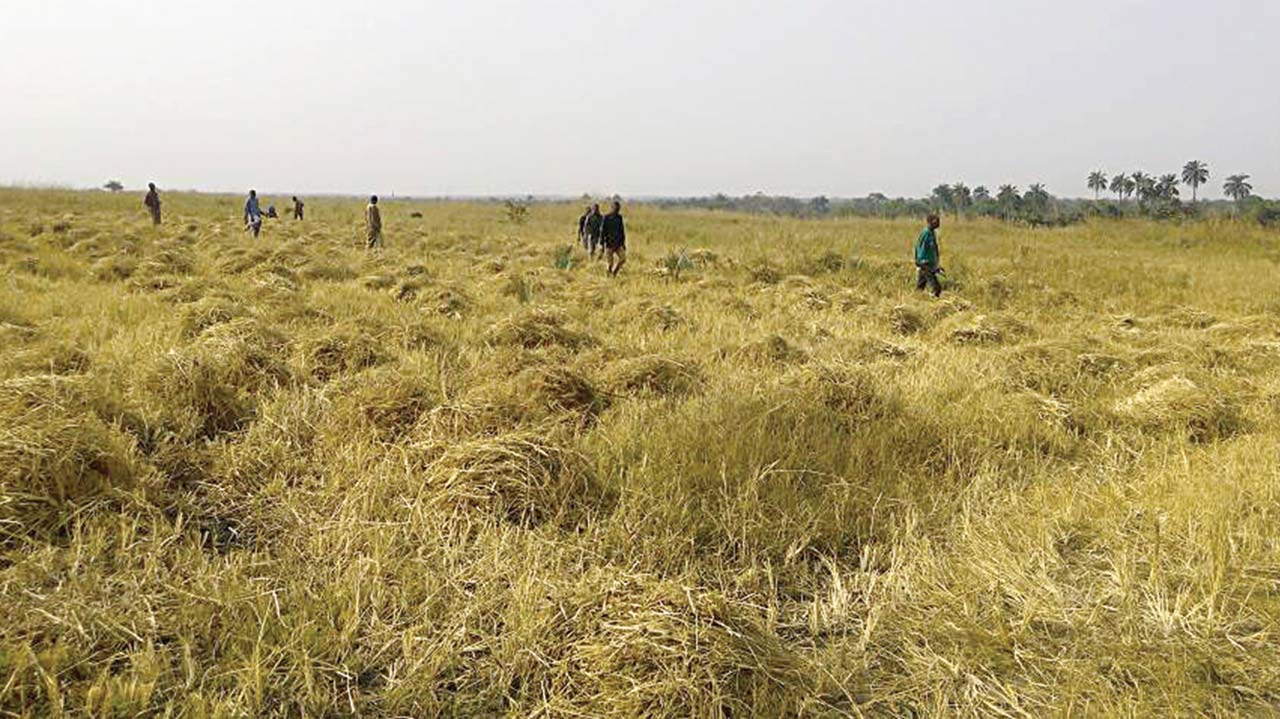
Osun Explains Plans to Dominate Southwest Agriculture
But his willpower to create wealth and generate revenue for the government, through agriculture is yielding fruit.One factor that has assisted the state in boosting the Agric sector is the fact that majority of Osun people are farmers, coupled with abundant arable land to cultivate food and cash crops. Agro-allied industries and other opportunities in the area of food processing have since been thriving.

With a vision to make the state the food basket of the region, Governor Rauf Aregbesola, disclosed to The Guardian that it has so far achieved the eight major things in the vision he laid out six years ago when he took the mantle of leadership on November 27, 2010.
The eight areas include; exporting of over 50,000 tonnes of cocoa annually; creating over 16,000 jobs for indigenes; construction of over 700km rural roads to reduce cost of transportation and increase access to markets; construction of over 30 bridges, with access given to areas cut-off from civilisation; over N2.8b loan given to farmers; over 11,000 farmers supported with direct cash transfers; 5,000 farmers’ co-operatives registered; and government intervention to over 71,000 farmers.
Presently, the state has commenced investment partnership with Ag Vest Greenhouse on Commercial Horticultural Projects, in the area of producing tomatoes, pepper and sweet melon under greenhouse conditions in commercial quantity.
The governor, his deputy, Mrs. Grace Titilayo Laoye-Tomori, and other members of his team recently visited one of the major rice farms collaborating with the state government to produce Ofada Osun Rice.
If the partnership matures, it is expected to break the country’s reliance on imported rice, generate more income for the state and also create job opportunities, as people from every part of the country would be coming into the state to transact business in rice value chain.
The Guardian’s visit to one of the farms in Songbe borders, near Ogbagba in Iwo area of the state, attested to the drive. Though the rice has just been harvested, the plan is to cultivate 450 hectares mainly for rice in the next three weeks, for the new planting season.
The Guardian learnt that the move is part of the holistic agricultural policy of the state, which has placed it on the green map of the Southwest within the space of six years; making it one of the major suppliers of agricultural produce to markets in Lagos and other Southwestern states.
Executive Chairman of ajogbe group, Bosoye Olalere, who is partnering the state, said the target for the new planting season is to do a lot more than last year, noting that additional land has been acquired to achieve the dream.
While disclosing that youth, under the state modern agriculture techniques would be integrated into the system, where they would be given acres of land to cultivate and manage, he added that 35 workers are on the payroll of the farm, noting that during harvest ad-hoc staff would be employed, as another way of creating employment.
“The idea of the farm is to run an integrated farming system. There is a plan to build the processing plant, which is the second phase of the project for processing of rice paddy.”
Recently, the governor led a delegation to Germany in search of new insights on modern agriculture. Germany has in the past four years trained over 40 young people from the state in modern agriculture techniques such as ‘40days Goat Fattening’, among others.
This initiative, which forms part of the state government’s policies on agriculture is located at Oloba Farm Settlement, Iwo, where 1,500 hectares of land has been acquired, and a 78 hectares cattle ranch established for the fattening of cattle and goats.O-Beef, as the programme is called, would see the state dominate the supply of beef to larger markets in Oyo, Lagos and other parts of the southwest. The ranch has the capacity to supply 10,000 cattle.
Owned by the state, but managed by Mr. Sola Omidiran, who took over the place, a year ago, the focus of the cattle hub is to make it a place where people can buy cattle without going outside the region.
Aside the 40 youths who trained in Germany, another set of 2,806 Osun Youth Empowerment Scheme (OYES) cadets, were also trained in modern agriculture practices at the OREAP Youth Academy, Odua farmers Academy, and Leventis foundation.
Omidiran disclosed that five of the youths sent to Germany were sent to the farm to practicalise what they learnt and to also garner more experience in breeding animals, adding that through the GEMS 4 project, the state will also train 2,000 farmers, to expand the scope of the farm to help them rear more animals.
The Guardian learnt that other trainees who arrived from German in 2016 are also breeding pigs, using modern techniques at Leventis foundation fattening centre, Ilesa.
In addition, the state government has secured 2,000 hectares of land for another cattle ranch in Ede and Ejigbo local government areas. N40m loan support was also granted to registered pig farmers’ cooperative society to boost their production.
The Germany trained farmers said the first batch of fattened goats would be ready for sale in various markets across the south-west.One of the governor’s aides, Kikiowo Ileowo told The Guardian that the state has established a Commodity Purchase Scheme in conjunction with Unicapital Limited for maize and soya bean; established agro-input distribution scheme with Unicapital limited on the operation of farmers input supply and services company (FISCO); and also executed over 1,200 subprojects including boreholes, access roads, mini dams, abattoir, poultry pens, pig farms, agro-processing, agroforestry were executed in 72 communities with 15,000 persons, through the FADAMA 3 project, as direct beneficiaries.
“Under this administration, Osun forestry reserve has grown to 90,000ha; 65 farm input distribution centres established to ease access across the state; 5000 tonnes of fertilisers sold to farmers at 50 percent subsidised rate; and over 10,589Ha of land sourced for an agricultural land bank. Additional 5,000 new farmers’ cooperatives were registered; 11,500 farmers have been financially supported, through which 16,000 new jobs were created. Over N2, 601,669,532 were given to farmers as loans.”
He disclosed that over 33,200ha of land was allocated to 950 farmers across the state; construction of 120 cribs; two commercial and six smallholder feedlots; new vet clinic in Ejigbo and eight-room (Vet centre) kennel in Osogbo; and centralised modern abattoirs at Iwo, Osogbo, Ilesa and Ile-Ife, to support various group of farmers.
“We acquired 10 sets of cassava processing equipment; 10 sets of cassava chipping machines; three sets of yam flour processing equipment; four sets of multi-grain threshing equipment and 20 rice harvesting equipment were equally provided to farmers. A Memorandum of Understanding was signed with the International Institute of Tropical Agriculture (IITA) for the establishment of a demonstration farm (204.39 Ha) at Ago Owu Farm Settlement for training on best farming practices.
“Through the Osun Broiler Outgrowers Production Scheme, over 200 millionaires were made; 1,830 rural farmers from 61 communities, were given inputs in collaboration with UNICEF. 500,000 cocoa seedlings; 6,000 kola nut seedlings; 6,000 bitter kola seedlings; 64,000 oil palm seedlings and 25,000 cashew seedlings, were provided to farmers free. 160 youths in four cooperative societies were empowered in cattle farming; 40m loan wase given to pig farmers’ cooperative society; and direct financial supports to 11,510 farmers in 461 farmer cooperatives,” he stated.
Ileowo added that two storage facilities with a combined capacity of 1,500mt were built in Oyan and Osogbo; over 100 cribs with a combined 1000mt capacity built across the state; supported farmers to cultivate 80ha of yam and 410ha of rice production at Onilapa, Ogbagba; establishment of Greenhouse in Wasimi and 2,000 farmers to plant 1.3m suckers for refined plantain flour production.
“More than 578 poultry farms stocked with over 3,654,612 day-old-chicks; we supported FOB venture in Ede to increase its production capacity from 25,000 to 100,000 broilers per annum and 400 fish farmers under Osun fisheries outgrowers scheme, among other interventions.”


